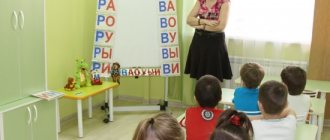Many children have problems with diction. Incorrect pronunciation of sounds can become entrenched and then it will be much more difficult to teach the child to pronounce words clearly and clearly. For this reason, at an older age, many psychological complexes develop; it is difficult for a person to read, express his thoughts out loud, he withdraws and reduces communication with the surrounding society to a minimum. That is why, from the age of 4-5, children are referred for consultation to a speech therapist. The specialist determines whether there are problems with pronouncing sounds and teaches the child to speak correctly. How to make an appointment with a speech therapist at a children's clinic will be discussed below.
Who is a pediatric speech therapist?
A specialist with a higher pedagogical education who knows effective methods for correcting speech development defects in children under 14 years of age is a children's speech therapist. For children with minor speech impairments, classes with a specialist in this profile, available in most kindergartens, may be sufficient. Children with serious speech disorders are referred to a speech therapist at a children's clinic for individual lessons. Such communication with a specialist includes special exercises for training the muscles of the cheeks and tongue, saying tongue twisters, learning songs and much more. Good specialists often have their own effective methods that allow them to achieve excellent results.
Important: if the child has speech problems, classes should be systematic, all recommendations of a specialist should be followed by studying with the child at home, involving all family members in this process
Individual lessons with a child conducted by an experienced specialist are mandatory for severe speech disorders, which include:
- aphasia, when speech is absent due to organic lesions of the cerebral cortex;
- alalia, absence of speech while maintaining normal hearing and intelligence;
- severe degrees of logoneurosis (stuttering), the main causes of which remain psychological problems (experienced stress, parental divorce, lack of attention).
In addition, the baby may be diagnosed with:
- GSD (general speech underdevelopment);
- dysarthria (impaired speech clarity, tempo, intonation, voice problems);
- dyslalia (the child cannot pronounce a sound or group of sounds correctly).
If a problem is identified, it is necessary to help the child in a timely manner.
After all, the absence of speech leads to inevitable delays in mental development, which worsen as the child grows up, and even if the child
speaks, there are long coherent phrases in his speech, the baby can please you with a story about his day or events during a walk and pronounces only some of the sounds incorrectly; classes with a speech therapist can correct the situation. It is better to do this before school; problems with speech make it difficult to perceive new information and lead to a decrease in academic performance.
How does a speech therapy kindergarten differ from a regular kindergarten?
There is an opinion that a speech therapy group is a certain “stigma” in a child’s personal file. Is it really?
First, let's figure out what a speech therapy group is?
Correctional groups are divided into speech (speech therapy) and groups of children with mental retardation (delayed psycho-speech development).
In speech therapy groups, they introduce sounds that were not there and correct incorrectly pronounced ones (correction of speech defects), enrich the vocabulary, develop phonemic awareness, coherent speech, and teach correct grammatical formatting. In the senior and preparatory groups they prepare for learning to read and write.
In the ZPR groups there are both a speech therapist and a defectologist (in addition to teachers who have the necessary qualifications). Also, a speech center can work in a kindergarten - in this case, a speech therapist individually works with children with impaired pronunciation according to a certain schedule.
But in any case, a speech therapy group in our time is not a punishment, but, most likely, a reward, because it has become more difficult to get there, and the general underdevelopment of speech is easier to correct in the garden, where all the work is aimed at eliminating this problem.
Perhaps it is no longer a secret to anyone that in speech therapy kindergartens the preparation of children, no offense to anyone, is sometimes much stronger than in mass kindergartens. Because children from speech therapy groups come to school with a much better vocabulary than children from a regular kindergarten. They know more, they have a wider vocabulary, and many skills are better developed, starting with graphic skills, sound-letter analysis and ending with stories based on pictures. Generalizing concepts are better formed. That is, children come from speech therapy kindergartens even more prepared.
Some parents are very attracted by all this splendor, and they dream of enrolling their children in a speech kindergarten. Others are afraid of speech therapy kindergartens, believing that a child who finds himself among poorly speaking peers will begin to speak even worse than before.
These are misconceptions. A child with speech therapy problems does not begin to speak worse because he communicates with other children with similar disorders. The only exceptions are those cases when a child with pronunciation problems ends up in a group of children who stutter. Indeed, there are cases where a child develops stuttering “by imitation.” But specialists, as a rule, avoid such mistakes.
So, for one reason or another, you think that your child definitely needs a specialized speech therapy group. What do you need to do to get into a speech therapy garden?
The speech therapy kindergarten accepts children mainly 4-5 years of age, since correction of speech disorders is especially important for them in order to successfully prepare for school. From the age of 3 you can join a group for children with delayed psycho-speech development (DSD).
When to contact a pediatric speech therapist
Of course, each child is individual, everyone develops differently, but normally a one-year-old baby should understand some simple phrases addressed to him, show the location of the eyes, nose and mouth, and understand the meaning of the word “impossible.”
At two years old, a baby normally knows more than 20 words, speaks simple phrases, responds to messages “Let’s go for a walk” by starting to get dressed or pointing to clothes for a walk, brings a certain toy upon request, and is able to listen to a short fairy tale.
By the age of 3, a child already has a fairly extensive vocabulary, asks a lot of questions, and tries to share his impressions with his parents.
Today, the norms have changed somewhat, many three-year-olds are just beginning to speak in sentences, and the number of words spoken has decreased significantly.
However, if a child has not started talking by the age of three, avoids communicating with peers on the playground, and cannot interact with loved ones, this is a serious reason to turn to specialists.
In this case, a consultation with a neurologist is necessary, a hearing test should be performed and a speech therapist should be consulted.
A comprehensive examination of the baby will identify the problem and begin treatment. Even if your family or close friends have examples where a child was silent for up to 3 years or more, and then spoke successfully, this is not a reason to postpone a visit to specialists.
How can a speech therapist work online?
Development trends in the modern world lead to the increasing popularity of online work and some services can now be provided remotely. Speech therapy practice is no exception - programs such as Skype or Zoom help successfully conduct speech correction classes for children, adolescents and adults. Online speech therapy work is a good alternative to regular speech therapy classes when it is not possible to personally visit a speech therapist due to geographic distance.
Advantages of online work
- You can study in comfortable conditions without leaving your apartment or office.
- It is easier to ensure continuity and regularity of correctional work.
- Online speech therapy classes are more profitable in terms of time and financial costs.
Disadvantages of online work
- It is difficult to establish personal and emotional contact with the student.
- In the process of speech therapy work with young children, it is necessary to involve parents in classes.
- Dependence on the uninterrupted operation of the Internet and the serviceability of the device with which the lesson is conducted.
- It is impossible to implement correctional tasks that require the personal participation of a speech therapist: massage or mechanical sound production.
The experience of speech therapy work shows that if properly organized, distance speech correction classes can be no less effective than speech therapy classes in person with a speech therapist.
What equipment is needed for online speech therapy work?
LAPTOP OR PC WITH WEB CAM
A laptop and PC have a significant advantage over even the most expensive and new mobile devices and tablets.
Firstly , a large screen and a clear image help you see all the movements of the articulatory apparatus. Poor quality images or small screen sizes make visual control difficult for the speech therapist. Consequently, assistance may not be provided correctly.
Secondly , the laptop is stable on the table surface, unlike a tablet or phone, which can fall. If this happens during the demonstration of pictures or the method of performing the exercise, the lesson will be interrupted at the most crucial moment.
Thirdly , a laptop and PC allow you to display a screen on which your e-books, speech therapy manuals or pictures can be opened. This is more difficult to do on a phone or tablet.
Fourthly , the loading speed and operation of various programs on a PC and laptop is much higher than on mobile devices. It's easy to get confused with apps on your tablet. Moreover, phones and tablets regularly receive messages and calls, which significantly reduces the quality of work.
HEADPHONES AND MICROPHONE
Headphones and a microphone are not necessary, but they greatly improve the quality of the experience. Thanks to headphones, only you hear your student and the sound does not spread to neighboring rooms. Headphones also help to track all the nuances of sound pronunciation or voice sound. And the microphone will help you control the volume of your own voice.
What programs are suitable for online speech therapy work?
SKYPE Skype is the most popular program with high-quality video calling. Skype is great for individual lessons with children and adults. Advantages of speech therapy work on Skype:
- the program is easy to install, has simple functionality and an interface that both children and adults can understand;
- Skype allows you to share your screen, on which your pictures or speech therapy manuals can be opened.
ZOOM Zoom is a conferencing platform that will help you conduct not only individual classes, but also group ones. Zoom is a little more complicated than Skype. But Zoom provides equally high-quality video communication and also allows you to share your screen. Advantages of working in Zoom:
- allows you to work simultaneously with a small group of students;
- ensures complete confidentiality of speech therapy work;
- allows you to demonstrate only the screen with the necessary speech therapy aid.
Zoom or Skype must be downloaded and installed on your computer. If you use these programs from a browser, they will slow down and freeze.
Recommendations for online speech therapy classes
1. Organize your workplace in a separate room where no strangers will be present. 2. Consider the lighting - work in front of a window during the day, and use additional light in the evening. 3. Prepare in advance manuals, tools or toys that will be useful to you during the lesson. 4. Copy all electronic manuals into a separate folder called “Classes on Skype” 5. Store links to various online resources in a single text document. 6. The structure of the lesson and the order of work do not differ from a regular speech therapy lesson. 7. Involve parents in the activities - ask them to sit nearby and provide assistance if necessary. 8. Warn your students that lessons on Skype must be taken responsibly:
- get in touch on time; - study while sitting at a table; - Put yourself and the room in order.
The most important thing is to feel comfortable and confident while working. Carry out correction work without fuss. Behave as naturally and enthusiastically as you would in a regular speech therapy session. We hope our recommendations will help you work online easily and effectively!
useful links
Speechbolix is an online training program for stuttering correction in adolescents and adults. Dictionbolix is an online program for improving diction, developing erudition and improving communication.
How to make an appointment
You can make an appointment with a speech therapist in a children's clinic at the reception of the medical institution during a personal visit, by telephone, by calling and specifying the appointment schedule. In addition, registration is carried out on the website of the selected clinic. Often, parents are referred to see a speech therapist by a pediatrician on the recommendation of a specialist from a preschool institution.
Unfortunately, it is not yet possible to sign up with a speech therapist through the State Services portal.
If the appointment is made at the medical institution at the place of registration of the child, the doctor’s appointment will be free; if the parents looked for a specialist on their own, the price of the visit may vary significantly among different doctors.
How to find a good speech therapist and where to look?
More and more children need speech therapy help. But a professional should work with the child. How to find such a professional and what qualities should he have? The truth is that a person's professionalism can only be determined by another professional in the same field . Those. You personally, if you are not a speech therapist yourself, will not be 100% able to determine whether the person in front of you is a professional. This is worth remembering when listening to “good reviews from friends.” If they are not speech therapists, then their reviews, to put it mildly, mean nothing. And on the Internet, everyone buys as many reviews about themselves as they want.
And yet there are indirect signs that will help you cope with this task.
Contact with the child . Even if a speech therapist is a doctor of science at least three times, if emotional contact is not established, you will achieve results much more slowly. Of course, we should not forget that children are all different and there are some who find it difficult to meet new people. In this case, it is worth observing several classes in order to determine as accurately as possible whether the teacher is suitable for the child. Also take a closer look at the speech therapist yourself: how he behaves. A competent specialist must have correct, beautiful speech, and the ability to correctly construct sentences. Qualification. Unfortunately, even a higher education diploma will not give you a 100% guarantee of a highly qualified specialist. But it wouldn’t hurt to inquire about the availability of such a diploma. You can also ask to see the speech therapist’s portfolio.
To provide effective assistance, the material and technical base is important. At your first meeting, pay attention to the number of teaching aids in the office.
The most reliable way to confirm your qualifications is the network structure of the company you are applying to. No one checks a single specialist either when applying for a job, or the classes he conducts (whether a private trader, a speech therapist in a kindergarten or in some “developer-diversified specialist”, etc. But here it should be remembered that the quality of classes at home in times worse than in a specialized office. Otherwise, what are millions of employees doing in offices when all the work could be done at home? That's right: refrigerator, TV, sofa, Internet... And if an adult cannot motivate himself at home, how to deal with it to kid?
And yet, what price is optimal? Here you think about what you want to get for your money. Soft sofas for those waiting, free WiFi, coffee, TV and large rooms - the price will be high, because... All this is not free and you pay for it.
Group classes, private classes at home, speech therapist in the garden, classes via Skype - the price will be low. But the effect of the classes will be even lower.
We decided to look for a “golden mean”, but at the same time completely exclude low-effective options, and also work without unnecessary frills for those waiting. Yes, this reduces our profit, but due to the large flow of people who are willing to pay for a specific solution to problems in the shortest possible time and due to the large number of our centers, we offer one of the lowest prices for individual (most effective) classes.
And yet, even with such a low price as ours, it is worth thinking through and planning the family budget in advance, taking into account the fact that classes with a speech therapist will most likely take place at least twice a week (the frequency depends primarily on your capabilities - time and financial; the more often you practice, the faster the result will be). And if you quit classes “halfway”, there is a high probability that your child’s speech will return to its previous state, and all the money you spent will go “down the drain.” A common question parents ask is “How long will it take to see a speech therapist?” After all, knowing the price, you also want to know the period during which the family budget will incur additional expenses. For a detailed answer to this question, see the link in the article of the same name. Here we will say briefly: you should be wary if the speech therapist gives a very clear forecast regarding the timing. Please take into account that the teacher has not known the child for so long, and during the diagnosis, children are often nervous; accordingly, the teacher will not be able to see the full picture of behavioral reactions. But how a child will behave in class - complete tasks, or shirk them, be capricious - is one of the important components of success. Also, the teacher does not know whether you will personally study at home with the child and monitor his speech, without which the time required for producing sounds will increase significantly.
Where to look?
There are many options, both cheap or even free (budget kindergarten, clinic) and not so (speech therapist within a multifunctional development center, private classes at home, speech therapy centers). We will not take into account the “human factor” or any specific companies; we hope that you will come across the best people and companies in the country. Let us consider only the structural disadvantages and objective advantages of each of them.
In state budgetary organizations (kindergarten, clinic, GPPC, etc. options):
Pros:
1.Free or inexpensive.
2. If this is a speech therapist in a kindergarten, there is no need to take the child anywhere separately, everyone is in one building.
Cons (for more details, see the article “Will a speech therapist help in kindergarten?”):
1. Complete lack of control over the professionalism of the speech therapist.
2. The speech therapist has no motivation to work with your child; no one checks him on this matter.
3. You have no idea what is being done in class.
4. Very short-term classes (in a regular kindergarten - 10 minutes, in a correctional kindergarten - 20 minutes)
5. Very long queues. In order to get to a speech therapist at all, they will often require a certificate, wait another year, “don’t come before 5 years old,” etc. Many parents face this.
6. A huge flow of children. The norm for a speech therapist at a school, for example, to which several kindergartens have been added, is 1000 children. Do you think he will be able to study with this amount two or three times a week for at least 10 minutes? If he receives all these children for 9 hours without breaks, breaks, lunches and rest, then it will take 11.8 minutes for each. According to reporting, he is engaged, we are talking about reality.
Private speech therapist (tutor) at home.
Pros:
1. Tutors who come to your home are very convenient. There is no need to take your child to a specialist; the speech therapist will come himself and bring with him some of the teaching aids.
2. They couldn’t even come up with a second advantage. Think for yourself.
Minuses:
1. Complete lack of control over the professionalism of the speech therapist.
2. The speech therapist does not have the motivation to quickly correct your child’s speech. The longer this happens, the more he will earn. And no one controls him on this or any other matter.
3. You have no idea whether your child is being treated CORRECTLY or not. No one checks such a speech therapist.
4. The speech therapist will only be able to bring a couple of aids with him. If something doesn’t work out for your child, then the speech therapist will not replace benefits, which is wasted time and your money down the drain. But no speech therapist will carry 2-3 cabinets with manuals to your home.
5. My home is my castle. And also toys, favorite places, a refrigerator with “goodies”, cartoons, etc. Very often, children do not want to study normally at home, they are capricious, inventing that they feel bad, want to sleep, are tired, etc. And the teacher will not be forced to engage in the educational process, but to play the role of an “animator” who must entertain the child. The child will get used to such “entertaining education”, come to school, and there will be 30 children per teacher in the class. “Have fun” to the fullest.
Speech therapist in a private clinic.
Pros:
1. A medical license inspires confidence.
2. The proper level of pathos: waiting room, reception, sweets, etc.
Minuses:
1. Prices are two to five times higher than market prices.
2. “Multiprofessionalism”: one specialist receives a bunch of diplomas for completing accelerated courses and can treat anything, as long as they pay well. For example, we personally met the services of a speech therapist at the ophthalmology center. Don't see the connection? Bring money, they'll come up with a connection for you.
3. They will probably ask you to take a dozen more tests from them in order to definitely determine the diagnosis.
4. Do you personally feel comfortable in the hospital (if you are not a doctor, of course)? Here. And the child begins to think that he is sick, since he goes to the clinic. We think it would be more correct if he thought he was healthy and just went to classes.
Speech therapist at a development center somewhere nearby.
Pros:
1. Often close to home.
2. Low prices, especially for group lessons.
3. Here you can sign up for several classes in a row: mental arithmetic, drawing, chess, etc.
Minuses:
1. Complete lack of control over the professionalism of the speech therapist. There is no senior speech therapist above the speech therapist who would check him when applying for a job and during the work itself.
2. A speech therapist most often has 2-3 small shifts per week when he conducts classes. This is clearly not enough for a person to even eat normally, not to mention other needs. Therefore, he either runs around several such centers and conducts classes, or in the same center he does mental arithmetic, drawing, modeling, etc. Could such a “one-man orchestra” be a specialist in each field?
3. Inconvenient schedule, most often 2-3 times a week in a limited time.
4. The center makes money in group classes, but you personally lose . Example: 5 children in a group, 500 rubles. per lesson. The center earned 2500 rubles. in 40 minutes, and your child received: 40/5 = 8 minutes of teacher attention for 500 rubles. Those. the effectiveness will be as many times worse as the number of children attending such classes. It’s as if they wanted to save money and signed themselves up for a group operation, for example, with a surgeon who also works as a medical assistant, a nurse and a watchman. The effect will be approximately the same.
Specialized speech therapy center.
Pros: 1. Most likely, only professionals who have passed all stages of interviews work here; 2. A special educational environment has been created in the classrooms to facilitate the development of speech skills by your child; 3. Specialists deal ONLY with speech therapy, i.e. You receive the highest level of professionalism.
4. Surely there is control over the conduct of classes. Please note whether cameras are installed in the office. If yes, then there is definitely control.
Minuses:
1. There are not many such centers even in Moscow; they will not always be near your home.
2. Although we said that we would not take into account the “human factor,” due to the small number of disadvantages, we decided to voice this one too - the position of the management of such centers. If it is aimed only at “earning money” from clients, at the very first diagnosis you will be bombarded with professional terms, asked for a subscription for a month in advance, given an incomprehensible price list with different cost of classes, depending on what you did during this class (and you have no idea, There was a lesson on alalia, or on dislalia, but the price will be different!), etc.
If the management of the center thinks not only about profit, but also about children: everything will be simpler, clearer, more convenient, and more loyal.
Good luck with your choice!
How is the appointment going?
At the first speech therapy appointment, the doctor interviews the mother in detail, asks questions about the course of pregnancy and childbirth, the presence of diseases in the baby, the presence of a hereditary predisposition to the presence of speech problems, and makes a general impression about the situation in the family.
Often, speech problems in a baby arise due to a lack of communication in the family, when there is no close contact with the parents, in cases where, while fulfilling their responsibilities for caring for the baby, they do not communicate enough with the baby, do not teach him to pronounce words and sounds, or speak too much quickly and the child’s brain does not have time to assimilate the information received.
Having collected all the data about the family, the specialist begins to communicate with the baby using certain techniques. At the appointment, it is important to establish emotional contact with the baby, and the time of the first appointment rarely exceeds 35 minutes.
After talking with the child, the specialist makes a speech therapy conclusion and tells the mother in detail about the baby’s speech problems and ways to eliminate them.
You should not be alarmed if a speech therapist discovers violations, but a frivolous attitude to his recommendations can result in big troubles.
Commission for a speech therapy group - why it is needed and how it works
Kuznetsova Anna
Commission for a speech therapy group - why it is needed and how it works
A referral to a commission to register a child in a speech therapy group causes protest and anxiety among parents. Many parents feel that the goal of the commission is to make a diagnosis and issue a certificate, but they are not interested in the needs of the baby.
In addition, hearing about a correction group in a preschool educational institution (preschool educational institution), parents have the feeling that their beloved child is mistaken for mentally retarded . And they, throwing away the voice of reason, strive to prove the opposite to everyone. Although the conclusion of a speech therapist is the first step towards eliminating the defect After all, the earlier a violation is detected, the easier it is to cope with it.
What is a speech therapy group and who needs it ?
The correctional group in kindergarten is designed to create optimal conditions for children with severe speech impairments to eliminate the defect, master the program for preschoolers and prepare for literacy (reading and writing)
At school.
In the speech therapy group , educators and defectologists work on establishing correct articulation, improving the perception and recognition of phonemes by ear, increasing passive vocabulary, developing coherent oral speech, and eradicating grammatical errors. Additionally, classes are conducted that develop fine motor skills of the fingers, the ability to draw, strengthen memory, promote concentration, and the development of imaginative and spatial thinking. This comprehensive approach allows you to quickly eliminate speech underdevelopment.
Corrective work is carried out jointly by a speech therapist , a teacher, a physical teacher and a kindergarten music worker, and a psychologist .
PMPC - what is it?
The commission for the speech therapy group is called PMPC and stands for psychological-medical-pedagogical . Children 4–5 years old with severe speech disorders are referred to PMPK. And speech disorders that do not correspond to age, a child of 5 years old cannot correctly pronounce sounds that should have already formed by this age.
The purpose of the commission is a comprehensive examination of the small patient, identification of speech disorders, recommendation of the necessary training program and duration of correction.
The PMPC includes:
pediatrician (children's general practitioner)
;
clinical psychologist;
psychiatrist or psychoneurologist;
speech pathologist or speech therapist .
A teacher , speech therapist , psychologist or head of a preschool educational institution recommend passing Parents can also initiate an examination on their own, believing that the child needs help from a speech therapist .
How to get on the commission ?
The first thing that is necessary is to take a referral for a PMPK examination in kindergarten, from a speech therapist or pediatrician . Then you need to prepare the necessary package of documents.
From the preschool educational institution that the child attends, you need to take a reference from the teacher and speech therapist , certified by the signature of the head and seal.
Then the date of the commission . Registration for examination is carried out at the city center for psychological, medical and pedagogical support . When undergoing the examination, parents provide passports, the baby’s birth certificate and a prepared package of documents.
What happens at the commission ?
Parents come to the examination with their baby. The PMPK meets collegially in one room. A speech pathologist , clinical psychologist, teacher, psychiatrist or neurologist talks with the baby in the presence of adults
The listed doctors are located at the same table, communicating with the child standing opposite them. Or they are at different tables, and the baby takes turns approaching each person present. During the examination you will have to answer questions and complete tasks.
The atmosphere of the commission can frighten the child. Specialists do not try to find an approach to the baby; they ask questions hastily, without giving time to think.
The duration of the examination is 30-40 minutes. It is important that parents encourage the child.
How to prepare?
Before the examination, you need to explain to the child what is required of him, explain in what form the conversation will take place . You can ask your child the questions that will be on the commission . They depend on the age of the baby and the preliminary diagnosis.
At the commission, experts ask :
Tell about yourself and your family: name, age, place of residence, occupation of parents. Describe what the baby prefers to play with friends, what to do with mom and dad. Give the names of teachers and nannies. Tell about your pets: what they name, what they eat, how they play. Describe your home: the number of rooms, the purpose of the kitchen, toilet, bathroom.
Tell him what he knows about the concepts of day and night, weekdays and holidays, describe his daily routine.
Name the colors and shapes of the objects shown in the pictures, their location (under the table, on the chair, above the window)
.
Sort the pictures into groups : food, pets, furniture, toys. Find an extra item in the row, explain why .
Name the parts of the body and their purpose.
Remember a series of objects, turn around and find what has changed.
Repeat the words spoken by the specialist in the same order.
They check the articulation and literacy of sentence construction in accordance with age standards. The child should know what synonyms are (fun - joy, antonyms (crying - laughter, homonyms (key, braid, give examples.
Then phonemic awareness is checked. To do this, the child names the syllables of a given word and counts the words in the spoken sentence. They check whether the baby perceives the meaning of words that are similar in articulation: bark - hole.
The level of coherent speech is analyzed by asking a small patient to compose a story based on a picture.
The perception of someone else's speech is assessed by giving the task to retell a short story. The child must:
demonstrate how he sings, jumps, eats;
express your needs and feelings: tired, hungry, wants to sleep;
catching or hitting a ball, jumping on one leg is an indicator of coordination of movements.
The tasks and questions asked by PMPC members are not difficult. It is important to understand the reason why the child could not complete them. This could be banal excitement, pedagogical neglect, poor understanding of the Russian language (if it is not the child’s native language)
or speech underdevelopment that requires correction.
It is necessary to test the child in advance so that he does not worry when he hears a question or task, and understands what awaits him. However, the diagnostic questions of PMPK are standard and any child of a certain age can cope with them.
Commission conclusion
Based on the results of the testing, members of the PMPC draw up a protocol and familiarize the parents with it under their signature - this indicates the presence of the parents or legal representatives of the child at the examination.
The commission makes an opinion on whether the small patient can attend a regular preschool group , whether transfer to a specialized (
speech therapy ) group , whether correctional classes with a speech therapist , observation or treatment by a neurologist or psychiatrist are necessary.
The results of the PMPC are of a recommendatory nature. Parents themselves decide whether to adhere to them or not.
Information about the availability of correctional (
speech therapy ) groups for children with severe speech disorders in preschool institutions will be provided by the regional education departments.
How much does an appointment cost?
The cost of an appointment depends on the qualifications of the chosen specialist; in Moscow it starts from 1000 rubles for an initial appointment; in the regions, prices are slightly lower.
In children's clinics at the child's place of residence, if indicated, admission and subsequent classes are provided free of charge.
The frequency of classes is selected individually, taking into account the identified violations. Clinics often conduct group classes, selecting children with similar problems. Groups are formed taking into account the age and development of the child.
How to choose a good children's speech therapist
Usually, mothers give each other the contact details of a good speech therapist, because by communicating on the playground, parents often make new acquaintances. You can look for a good specialist on the appropriate website for your region. There is detailed information about the qualifications of the speech therapist supported by customer reviews. As a last resort, if there is evidence, the child is given a referral to a specialized kindergarten. To do this, you must pass a special psychological-medical-pedagogical commission (PMPC).
The arrival of a baby in a family is not only a holiday; raising and nurturing a child requires enormous effort from parents. Try to spend as much time as possible with your baby, communicate with him, talk, patiently teach him the simplest things. Do not give a child under 3 years old a smartphone, try not to give in to the temptation to turn on the TV and go about your business, if necessary, do not delay a visit to a specialist and let your “whys” open up this huge colorful world.
Conditions for receiving services on the site
Registration for a consultation or opinion from the Central Psychological-Medical-Pedagogical Commission (CPMPC) to confirm the right of a child with disabilities, including disabled children, to special conditions of education and upbringing in educational organizations, special conditions during state final certification.
The service is available to parents (legal representatives) and employees of educational organizations.
To undergo examination and counseling, the child’s presence at the Center for Medical Education is mandatory (except for the service: counseling for employees of educational organizations). A child under 18 years of age comes to the commission accompanied by a parent (legal representative).
To pass the commission, you must issue a medical report on your health status and recommendations for organizing the educational process.
Before submitting an application for the provision of services, you must check the relevance of the information posted in your personal account about you and your child (including documents) and, if necessary, correct them.
To obtain a consultation, a medical report on your health status is not required.
Applications are accepted throughout the entire calendar year. If you have any questions about the procedure for passing the Moscow Center for Medical Examinations, you can contact us by phone.
Who can apply for the service
Parents (legal representatives) of students:
under the age of 18, if it is necessary to create special conditions for training and education in an educational organization;
- to determine special conditions when conducting state final certification (SFA);
- for examination of students who will be 8 years old by September 1 of the next academic year, if for medical reasons they are recommended to begin studying at the level of primary general education after 8 years of age;
- for consulting on issues of education, training and correction of developmental disorders, students with disabilities and (or) deviant (socially dangerous) behavior.
Employees of educational organizations:
- for consulting on issues of education, training and correction of developmental disorders, students with disabilities and (or) deviant (socially dangerous) behavior.
Cost of service and payment procedure
For free
List of required documents
Documents required for passing the Moscow Center for Medical Education and Training in order to prepare recommendations for the creation of special conditions for training and education in educational organizations:
- medical report (Appendix 3 to the order of the Moscow Department of Health dated April 1, 2013 No. 297) on the state of health and recommendations for organizing the educational process in state educational organizations of the city of Moscow for persons with disabilities - original;
A child under 18 years of age comes to the commission accompanied by a parent (legal representative). To organize special educational conditions, create special conditions for children 8 years old on September 1 of the next school year, the following are provided:
- medical report (Appendix 3 to the order of the Moscow Department of Health dated April 1, 2013 No. 297) on the state of health and recommendations for organizing the educational process in state educational organizations of the city of Moscow for persons with disabilities - original;
- for disabled children, persons with disabilities, a certificate from the Bureau of Medical and Social Expertise (MSE) and an individual rehabilitation or habilitation program (IPRA) - copies with presentation of the originals or duly certified copies;
- student’s birth certificate - a copy with presentation of the original or a duly certified copy;
- student’s passport (if available) - a copy with presentation of the original or a duly certified copy;
- passport of the parent (legal representative) of the student - a copy with presentation of the original or a duly certified copy;
- previous conclusion(s) of the commission on the results of a previously conducted examination of the child (if available) - a copy;
- conclusion(s) of the psychological, medical and pedagogical council of the educational organization or specialist (specialists) providing psychological, medical and pedagogical support to students in the educational organization (for students of educational organizations) (if available) - a copy;
- referral to the Moscow Center for Medical Education from an educational organization, an organization providing social services, a medical organization, or another organization (if any) - original;
- characteristics of a student issued by an educational organization (for students of educational organizations) - original, certified by the seal of the educational organization;
- tests/written works in Russian (native) language, mathematics - copies certified in the prescribed manner, results of the child’s independent productive activity - original.
A child under 18 years of age comes to the commission accompanied by a parent (legal representative). Documents required to pass the Moscow Center for Medical Examination before the state final certification (GIA-9, GIA-11):
- medical report (Appendix 3 to the order of the Moscow Department of Health dated April 1, 2013 No. 297) on the state of health and recommendations on the organization of the educational process in state educational organizations of the city of Moscow for persons with disabilities with recommendations on the creation of special conditions when passing the state final certification in the current academic year - original;
- for disabled children, persons with disabilities, a certificate from the Bureau of Medical and Social Expertise (MSE) and an individual rehabilitation or habilitation program (IPRA) - copies with presentation of the originals or duly certified copies;
- student’s birth certificate - a copy with presentation of the original or a duly certified copy;
- student’s passport (if available) - a copy with presentation of the original or a duly certified copy;
- passport of the parent (legal representative) of the student - a copy with presentation of the original or a duly certified copy;
- previous conclusion(s) of the commission on the conditions of study (if available) - a copy;
- characteristics of a student issued by an educational organization (for students of educational organizations) - original, certified by the seal of the educational organization.
To organize an exam at home, you must additionally provide the following documents:
- medical report (Appendix 3 to the order of the Moscow Department of Health dated April 1, 2013 No. 297) with recommendations on the creation of special conditions when passing the state final certification in the current academic year at home - if it is necessary to pass the State Examination at home - the original;
- medical reports (Appendix 3 to the order of the Moscow Department of Health dated April 1, 2013 No. 297) with recommendations on home education for the last 3 years (if available) - copies certified in the prescribed manner;
- orders for transfer to home study for the last 3 years (if available) - copies certified in the prescribed manner.
A child under 18 years of age comes to the commission accompanied by a parent (legal representative). To advise parents (legal representatives) of students, specialists from the Moscow Center for Medical Education and Training provide:
- a detailed extract from the history of the child’s development with the conclusions of doctors observing the child in a medical organization at the place of residence (registration) or a medical report (Appendix 3 to the order of the Moscow Department of Health dated April 1, 2013 No. 297) on the state of health and recommendations for organizing educational process in state educational organizations of the city of Moscow for persons with disabilities - original;
- student’s birth certificate - a copy with presentation of the original or a duly certified copy;
- student’s passport (if available) - a copy with presentation of the original or a duly certified copy;
- passport of the parent (legal representative) of the student - a copy with presentation of the original or a duly certified copy;
- previous conclusion(s) of the commission on the results of a previously conducted examination of the child (if available) - a copy;
- conclusion(s) of the psychological, medical and pedagogical council of the educational organization or specialist (specialists) providing psychological, medical and pedagogical support to students in the educational organization (for students of educational organizations) (if available) - a copy;
- referral to the Moscow Center for Medical Education from an educational organization, an organization providing social services, a medical organization, or another organization (if any) - original;
- characteristics of a student issued by an educational organization (for students of educational organizations) - original, certified by the seal of the educational organization;
- written work in the Russian (native) language, mathematics, results of the child’s independent productive activity.
A child under 18 years of age comes to the commission accompanied by a parent (legal representative). To provide consultations to employees of educational organizations by specialists from the Moscow Center for Medical Education and Training, no documents are required.
Duration and result of service provision
Receiving information about the readiness of the conclusion of the Moscow Center for Medical Inspectorate or the provision of consulting services. The result is sent in the form of an electronic notification to the Personal Account on the Official Portal of the Mayor and the Government of Moscow and by email no later than 5 working days from the date of the reception.







